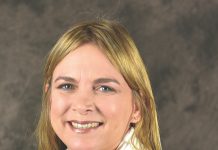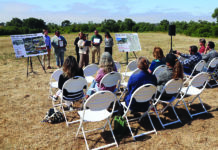SANTA CRUZ COUNTY—Santa Cruz County is days away from being placed on the California Department of Public Health’s Monitoring List and facing further economic restrictions, County Health Officer Gail Newel said at Thursday morning’s press conference.
With 531 active Covid-19 cases as of Thursday—and more yet to be reported because of a bottleneck in testing—the county on Wednesday was flagged by state health officials for surpassing its limit of 100 cases per 100,000 residents.
If the county stays above this threshold for three consecutive days, it will then be placed on the Monitoring List, Newel said. Spending three days on that list would mean some county businesses such as gyms, barbershops, beauty salons and places of worship and cultural ceremonies would have to close indoor services.
The economic restrictions would remain in place until the county notches two weeks below the threshold.
Newel said it is unlikely that the county will be able to lower its caseload enough in those six days to avoid the restrictions. She also said she would ask the state to write the updated health orders, which she expected would go into effect next week.
“I don’t see any way to reverse that at this point,” Newel said.
She, however, said that if the community followed the recommendations from the Centers for Disease Control and Prevention, which asks people to physically distance themselves from others, wear a mask, practice good hygiene and avoid gatherings, “we could again flatten the curve” in a matter of weeks.
“It’s our individual behaviors that determine our community outcome with this disease and, ultimately, the economic recovery,” Newel said.
Health Services Agency Director Mimi Hall said troubles with testing and the sheer number of active cases have made it tough to conduct contact tracing, which helps identify cases and limit the virus’ spread. Test results in most sites throughout the county are taking 7-10 days, according to Hall, and some community members have reported even longer waits. Additionally, scheduling a test through the state-run OptumServe site at Ramsay Park in Watsonville typically comes with a six-day waiting period.
To address those concerns, health officials have approved a $1 million allocation to UC Santa Cruz’s testing site so that it can purchase much-needed equipment such as reagents in order to more quickly process tests. That funding, which comes from the Coronavirus Aid, Relief, and Economic Security Act, could quadruple the testing site’s capacity, Hall said.
The county will also be purchasing additional testing equipment for its clinics and some of its “health partners.”
“We’re very hopeful that we will have a solution in the short term,” Newel said.
There have been confirmed cases in five of the county’s seven skilled nursing facilities and one person tested positive in the county’s jail system, but Hall said those cases have not resulted in outbreaks at either facility.
The county also recorded its fourth Covid-19 death, but Newel said the disease was not the leading cause of the death of the man in his 70s.
Though hospitalizations continue to rise, the county’s hospitals have been holding steady and are not yet close to capacity, said County Deputy Health Officer David Ghilarducci.
Watsonville continues to be the hardest hit community in the county, as 481 of the county’s 878 cases have been identified in the area. Newel said the county has worked with Pajaro Valley Prevention and Student Assistance and Salud Para La Gente to promote a consistent, simple and bilingual message in the Pajaro Valley.
Newel said several factors have led to Watsonville’s high case count, including crowded housing, high poverty levels and lack of access to healthy food and safe living environments. Much of the city’s Latinx population, which makes up more than 80% of the community, is also working on the frontlines of the pandemic in essential jobs, Newel said.
“Watsonville isn’t alone, this is happening in communities of color throughout the country,” Newel said.
She added that some employers in Watsonville were slow to implement protective measures during the early months of the pandemic, but most have come around.
“That has greatly improved,” she said. “We have found employers and businesses in Watsonville easy to work with.”













